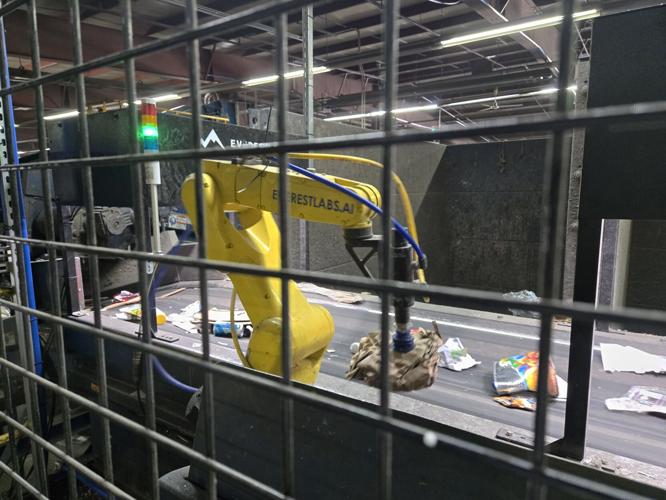In a row, one after the other, three robots use their metal arms and the power of suction one recent Thursday morning to identify and sort a mélange of plastics sailing by on a continuously moving conveyer belt, ready to be reprocessed and transformed into new items. Equipped with a 3D vision system and programmed with specific algorithms, the Everest Lab robots powered by artificial intelligence at Republic Services' recycling facility on Colorado Springs' northwest side have been tasked specifically. First, identify and remove any pieces of 2D materials — cardboard or paper, specifically — that may not have been separated out earlier in the recycling process.
A mountain of recyclable paper products sits inside Republic Services' recycling facility on Thursday, April 17, 2025, before it is processed at 4005 Interpark Drive on Colorado Springs' northwest side. Down the line, the first robot identifies and sorts detergent and soap bottles from the rest. The next robot sorts plastics like old water and soda bottles.

The third sorts containers such as old milk jugs. The sounds of air suction and release emanating from the AI-powered robots are nearly drowned out among the booming cacophony of forklifts and loaders moving, dumping and compressing literal tons of recyclable materials across the recycling plant at 4005 Interpark Drive. The AI-powered robots, which cost about $900,000 in total and were installed at Republic's Colorado Springs recycling plant in December, are cutting Republic Services' labor costs and helping process 65 tons of recyclable materials every day, company representatives said.
Republic Services processes recycling for about 25,000 of its own customers, as well as for customers at most all other of the company's competitors in Colorado Springs. Altogether, the robots are helping divert 60 tons of materials from landfills every month, Republic representatives said. Saving recyclables from landfills ultimately saves Republic money, too.
For example, Everest Labs estimates a materials recovery facility that processes anywhere from 200 tons to more than 700 tons every day loses $2 million every year to landfills, but can recover $400,000 in net new revenue by using Everest Lab's recycling robots. "These robots are extremely dependable, and they're learning robots," Republic Services General Manager Ken Atencio said. "I think we'll continue to go down this road and will (incorporate) more optics and artificial intelligence (into our operations).
Putting more automation in place will reduce labor costs and improve efficiency." The robots are programmed and run by Everest Labs, an AI-driven recycling platform headquartered in California's greater San Francisco Bay Area, and monitored by Republic Services. A human can change the robots' assigned tasks on a dime to fit Republic's needs, said the company's recycling maintenance shop lead technician Thomas Brackett.
Atencio noted that while the robots do replace some human labor, the human element is still crucial to running the recycling plant smoothly. "The AI systems will continue to learn, but you will always need someone who can review reports and our recycling percentage, responsibilities like that," he said. "We need to track if we are capturing the right amount of cardboard, paper or plastic in our recycling processes, so we will always need humans in the field.
".
Business

Automated robots bolster recycling processes at Colorado Springs facility

Three AI-powered robots are helping Republic Services process 65 tons of recyclable materials every day in Colorado Springs, diverting more than 60 tons of materials every month from landfills.














